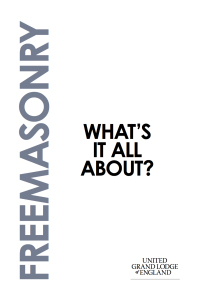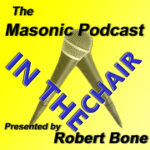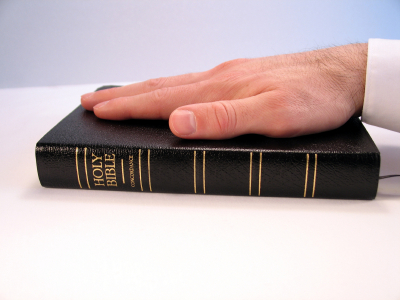Freemasonry is not a religion, but it does expect its members to have a belief in a Supreme Being. Every prospective candidate is asked to confirm that they believe in one of the recognised religions as part of the interview process.
This terminology is deliberately chosen to allow each prospective member to follow their own spiritual path. Making no distinction between religions enables men of different faiths to meet on the level. All Lodges will have the Bible open during ceremonies, but if members follow other faiths, their religious text will be open too. In this way, all faiths are treated as equal and their followers can participate fully in our organisation without discrimination.
 I have discussed Freemasonry with a number of my work colleagues and everything was going well until I discussed the need for a belief in a Supreme Being. At this point, they looked at me and asked me if I really believe in the archetypal bearded old man image of a deity. I cannot believe that I am alone in having this disappointing experience.
I have discussed Freemasonry with a number of my work colleagues and everything was going well until I discussed the need for a belief in a Supreme Being. At this point, they looked at me and asked me if I really believe in the archetypal bearded old man image of a deity. I cannot believe that I am alone in having this disappointing experience.
The challenge for Freemasonry is that UK society is becoming increasingly secular. Secularisation is the transformation of a society from a close identification with religious values and institutions toward nonreligious values and secular institutions. This process has been underway for a while, although academics argue as to whether it is a result of the permissive society of the 1960s or a process that started in the early nineteenth century and accelerated with that more relaxed world view.
Irrespective of the causes and start date of this process, the net result is that fewer people will be able to answer the “do you believe in a Supreme Being?” question positively with a clear conscience. How then do we address this specific challenge to our membership growth aspirations?
 I regularly listen to the Masonic Podcast and learn something new from every episode. I was particularly struck by an idea put forward in the interview Robert Bone recorded with Dr David West which was published as episodes 23 and 24. David is a member of St Laurence Lodge 5511 in Essex and has a degree in Philosophy from Exeter and a PhD from Leicester. He has published several books and his academic background means that they are well researched and argued.
I regularly listen to the Masonic Podcast and learn something new from every episode. I was particularly struck by an idea put forward in the interview Robert Bone recorded with Dr David West which was published as episodes 23 and 24. David is a member of St Laurence Lodge 5511 in Essex and has a degree in Philosophy from Exeter and a PhD from Leicester. He has published several books and his academic background means that they are well researched and argued.
 The secularisation of society was one of the many topics they discussed and it really made me think. What is the true purpose underlying the question regarding a person’s faith? Whilst the Craft ritual is deliberately not religious, we do ask for divine support in our undertakings and when we make solemn promises, these are treated in much the same way as a person swearing to tell the truth in court. Historically, swearing an oath to God served to remind to remind the person that they were making a solemn promise and that they would answer to their Maker if they broke that promise.
The secularisation of society was one of the many topics they discussed and it really made me think. What is the true purpose underlying the question regarding a person’s faith? Whilst the Craft ritual is deliberately not religious, we do ask for divine support in our undertakings and when we make solemn promises, these are treated in much the same way as a person swearing to tell the truth in court. Historically, swearing an oath to God served to remind to remind the person that they were making a solemn promise and that they would answer to their Maker if they broke that promise.
This parallel caused me to investigate further. How is the English legal system handling the secularisation challenge? The answer is that the option to affirm rather than swear has been adopted. This not only provides those with no professed religion, but also those with deep religious convictions that prevent them from swearing an oath, an acceptable option. The difference between an oath and an affirmation is that the oath is a religious commitment whereas an affirmation is non-religious.
As we profess to be a moral fraternal society, not a religion, is it time that we allowed people to affirm rather than swear? Is a lack of faith really a barrier to leading a moral life? Are many Lodges tacitly doing this anyway by counselling candidates about the questions? For some this may be a step too far – this post is meant to provoke considered debate for the good of Freemasonry’s future.
I would love to hear your thoughts on the matter using the comments area below. I moderate all comments so do not be concerned if your comment does not appear immediately.